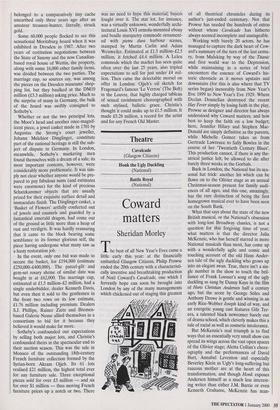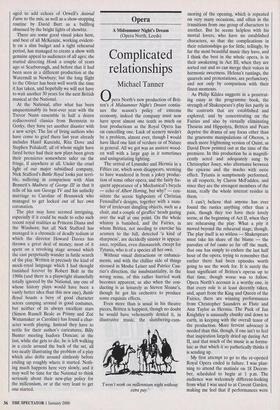Theatre
Cavalcade (Glasgow Citizens) Honk the Ugly Duckling (National) Battle Royal (National)
Coward matters
Sheridan Morley
The best of all New Year's Eves came a little early this year: at the financially embattled Glasgow Citizens, Philip Prowse ended the 20th century with a characteristi- cally inventive and breathtaking production of Noel Coward's Cavalcade, one which I fervently hope can soon be brought into London by any of the many managements which chickened out of staging this greatest of all theatrical chronicles during its author's just-ended centenary. Not that Prowse has needed the hundreds of extras without whom Cavalcade has hitherto always seemed incomplete and unstageable.
Working with barely 20 actors, he has managed to capture the dark heart of Cow- ard's summary of the turn of the last centu- ry, from Mafeking by way of the Titanic and first world war to the Depression, while maintaining in a series of brief encounters the essence of Coward's his- toric chronicle as it moves upstairs and downstairs (for this is also where that TV series began) inexorably from New Year's Eve 1899 to New Year's Eve 1929. Where Declan Donnellan destroyed the recent Hay Fever simply by losing faith in the play, Prowse as designer and director has always understood why Coward matters, and how best to keep the faith on a low budget; here, Jennifer Hilary and Stephen Mac- Donald are simply definitive as the parents, while Michelle Gomez takes us from Gertrude Lawrence to Sally Bowles in the course of her 'Twentieth Century Blues'. This production cannot, if there is any the- atrical justice left, be allowed to die after barely three weeks in the Gorbals.
Back in London, the National has its sea- sonal hat trick: another hit which can be flown on to the Olivier stage as an annual Christmas-season present for family audi- ences of all ages, and this one, amazingly, has the rare distinction of being the first homegrown musical ever to have been seen on the South Bank.
What that says about the state of the new British musical, or the National's obsession with long-lost Broadway classics, is not a question for this forgiving time of year; what matters is that the director Julia McKenzie, who has herself starred in more National musicals than most, has come up with a wonderfully agile and comic and touching account of the old Hans Ander- sen tale of the ugly duckling who grows up into an elegant swan. True, there isn't a sin- gle number in the show to touch the bril- liance of Frank Loesser's song of the ugly duckling as sung by Danny Kaye in the film of Hans Christian Andersen half a century ago, but the score by George Stiles and Anthony Drewe is gentle and winning in an early Rice-Webber Joseph kind of way, and an energetic young cast features Gilz Ter- era, a talented black newcomer barely out of drama school, which cleverly makes this a tale of racial as well as cosmetic intolerance.
But McKenzie's real triumph is to find ways that an essentially very small show can spread its wings across the vast open spaces of the Olivier stage; Aletta Collins's chore- ography and the performances of David Burt, Annabel Leventon and especially Beverley Klein as Ugly's long-suffering but raucous mother are at the heart of this transformation, and though Honk exposes Andersen himself as a much less interest- ing writer than either J.M. Barrie or even Kenneth Grahame, McKenzie has man- aged to add echoes of Orwell's Animal Farm to the mix, as well as a show-stopping routine by David Burt as a bullfrog obsessed by the bright lights of showbiz.
There are some good visual jokes here, and best of all McKenzie, working evident- ly on a slim budget and a tight rehearsal period, has managed to create a show with genuine appeal to audiences of all ages; she started directing Honk a couple of years ago at Scarborough, and before that it had been seen in a different production at the Watermill in Newbury; but the long flight to the Olivier has been well worth the time it has taken, and hopefully we will not have to wait another 30 years for the next British musical at the National.
At the National, after what has been unquestionably its best-ever year with the Trevor Nunn ensemble in half a dozen rediscovered classics from Bernstein to Gorky, they have yet another disaster with a new script. The list of living authors who have come to grief there last year already includes Hanif Kureishi, Rita Dove and Stephen Poliakoff, all of whom might have fared better had their new plays been given their premieres somewhere safer on the fringe, if anywhere at all. Under the cruel light of our major subsidised company, Nick Stafford's Battle Royal looks just terri- ble, suffering in comparison with Alan Bennett's Madness of George III in that it tells of his son George IV and his unlucky marriage to Caroline of Brunswick who managed to get locked out of her own coronation.
The plot may have seemed intriguing, especially if it could be made to echo such recent royal realities as Princess Diana and the Windsors; but all Nick Stafford has managed is a chronicle of deadly tedium at which the director Howard Davies has thrown a great deal of money, most of it spent on a revolving stage around which the cast perpetually wander in futile search of the play. Written in precisely the kind of mock-royal language which I had thought banished forever by Robert Bolt in the 1960s (and there is a playwright shamefully totally ignored by the National, any one of whose history plays would have been a vastly better idea than this new one), Battle Royal boasts a bevy of good character actors camping around in good costumes, but neither of its always excellent stars (Simon Russell Beale as Primly and Zoe Wanamaker as Caroline) has found a char- acter worth playing. Instead they have to settle for their author's caricatures, Billy Bunter meeting Isadora Duncan; at the last, while she gets to die, he is left walking in a circle around the back of the set, all too neatly illustrating the problem of a. play which also drifts around aimlessly before ending up roughly where it started. Noth- ing much happens here very slowly, and it may well be time for the National to think seriously about their new-play policy for the millennium, or at the very least to get one started.



















































 Previous page
Previous page